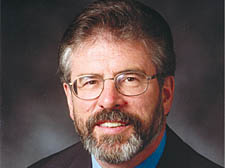|
|
 |
| |

Like Gandhi and Washington, Adams was once a terrorist in British eyes |
Man who broke the stalemate
Without Gerry Adams, there would have been no peace process in Northern Ireland, says Peter Berresford Ellis
AN IRISH EYE. By Gerry Adams.
Brandon Books £9.99 order this book
I FIRST met Gerry Adams in the mid-1980s when, as Westminster MP for West Belfast and president of Sinn Féin, he was still being demonised by the British Press and Media as a “terrorist” and a “criminal”. He had just published his first book, The Politics of Irish Freedom (Brandon, 1986).
He handed me a copy and told me that he had admired my books on Irish history, especially my History of the Irish Working Class (Pluto, 1985). He signed his book to me with the words “one good book deserves another?” His question mark.
With the publication of An Irish Eye, that “one good book” has multiplied into nearly a dozen from his pen. Not just works on political thought, but autobiography and fiction.
After that first meeting, and after I read that first book, my view was that Adams was one of the most considerable political thinkers in modern Ireland.
Surprisingly, he had read an article that I had published in The Guardian in 1984 in which I had pointed out that the Irish war had descended into a “slugging match” without any political will from the British Government to end it but no hope of military victory. Nor did the republicans have any hope of moving the intransigence of government by their war of attrition. There was stalemate.
Adams had come to the conclusion that if the British government could ensure full civil rights to the Catholics and allow power sharing, so that there was no re-emergence of the Unionist regime that had been so admired by Adolf Hitler and Hendrik Verwoerd in their time, if Britain removed the draconian legislation that had governed the north, stopped shoring up the Unionists both politically and militarily, then the republicans could adopt a democratic political role.
In fact, all that was needed was to adopt a real democracy for the first time in Northern Ireland since 1922. Reunification of the country could then be brought about by a natural osmosis.
Adams had reached his conclusions the hard way. He had been interned without trial, tortured, lived on the run and, two years before his first book, had survived an assassination attempt in which he had been shot and wounded in the neck, shoulder and arm. Twenty bullets had riddled the car that was taking him to court for a legal hearing.
He knew the dangers of being president of Sinn Féin. He had succeeded to the position of vice-president after Máire Drumm, as acting president, needing hospital treatment, was shot to death in her bed in the Mater Hospital in 1976.
That first book was an excellent account of the nature of modern Irish republicanism, the changes it had undergone and his view of the political situation and his hope for the future. Those hopes for a negotiated peace to the Irish conflict were still 10 years away due to the stubborn, outmoded attitudes of the Thatcher and Major governments who refused to respond to the feelers being put out.
Like countless others labelled “terrorists” who have emerged to fight for their country’s independence during the course of many colonial struggles – people such as Michael Collins, De Valera, Archbishop Makarios, Kenyatta, Nkrumah, Banda, Gandhi, Nehru, Awolowo, Jan Smuts, even George Washington, was once a terrorist in British eyes – Adams is now seen as a talented politician. Had he not been a politician, Adams would have certainly found fame as a gifted writer.
This latest collection of articles and essays covers the recent years of the Irish situation from 2005, when the IRA put its arms beyond use, to January 2007 when Sinn Féin made the historic decision to support the new policing and justice system in the North. But it is more than political commentary. It is told with Adam’s dry brand of humour. Now and again I found myself chuckling aloud.
His humorous remarks on the Victoria and Albert Museum’s attempt to stop an artist from inviting him to their exhibition of Che Guevara photos – one excuse being that they did not invite “politicians”. Actually Ken Livingstone opened the exhibition and who, after all, was Che Guevara?
For anyone who wants to understand Irish politics today, to be given an insight to the unparalleled historic changes that have been made, this is essential reading.
And for the passion, the humour and Adam’s unique perspective on these events, as well as his outlook on world politics, no one can afford to ignore this book from one of the most important political figures of our time. Let no one be in any doubt, without Gerry Adams there would have been no peace process and, indeed, no hope for the eventual reunification of Ireland.
|
 |
|
 |
 |
|
 |
|



